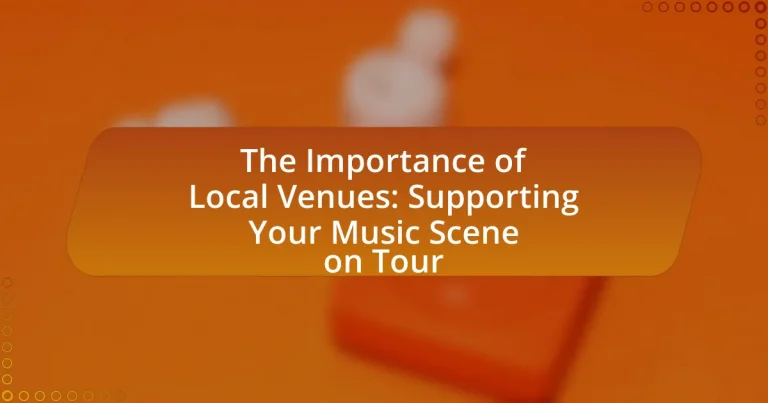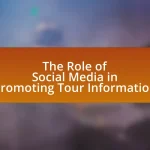Local venues are essential for musicians on tour as they provide platforms for live performances, enhance artist exposure, and contribute to the local economy. These venues support community engagement by hosting events that foster social interaction and cultural exchange. Despite challenges such as financial limitations and logistical issues, local venues offer emerging artists opportunities for growth through networking and promotional support. The article explores the significance of local venues in the music ecosystem, the benefits they provide to artists, and strategies for maximizing impact during performances. Additionally, it highlights the importance of building relationships with venue owners and engaging with local audiences to sustain a vibrant music scene.
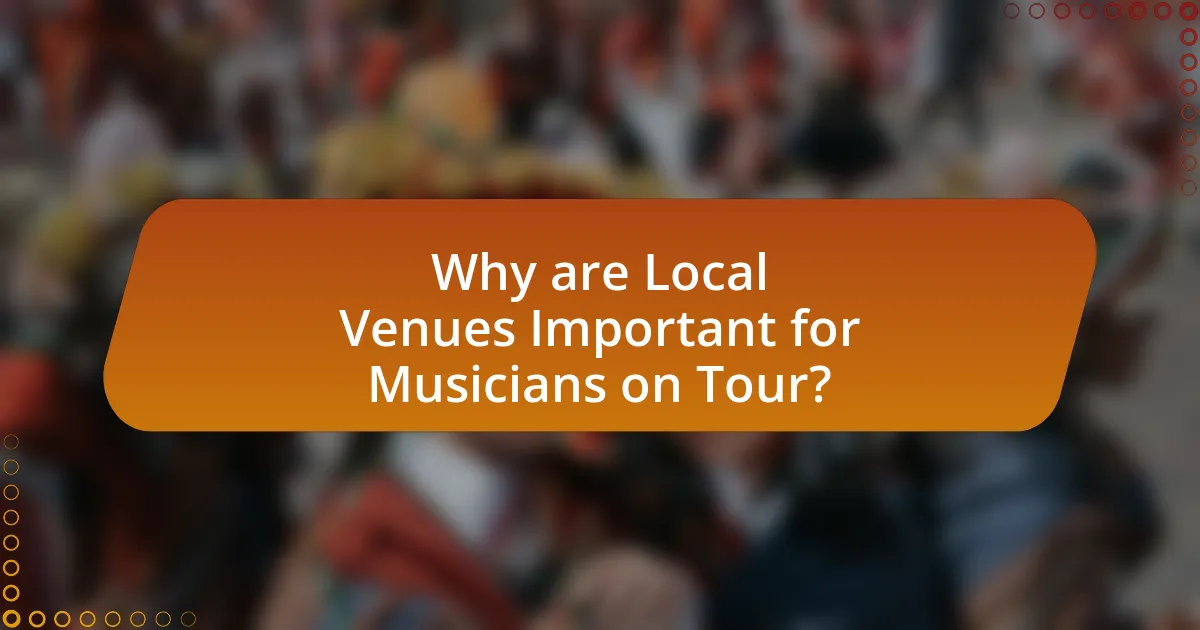
Why are Local Venues Important for Musicians on Tour?
Local venues are crucial for musicians on tour because they provide essential platforms for live performances, enabling artists to connect with local audiences. These venues often have established fan bases and community support, which can significantly enhance an artist’s exposure and reputation. Additionally, local venues contribute to the local economy by attracting patrons, which can lead to increased merchandise sales and future bookings. According to a study by the National Independent Venue Association, independent venues generate over $1 billion in revenue annually, highlighting their economic impact and importance in the music ecosystem.
How do local venues contribute to the music scene?
Local venues play a crucial role in the music scene by providing platforms for artists to perform and connect with audiences. These venues often host live music events, which not only showcase local talent but also attract touring acts, thereby enriching the cultural landscape. According to a study by the National Independent Venue Association, independent venues contribute over $1.5 billion annually to the U.S. economy and support thousands of jobs, highlighting their economic significance. Furthermore, local venues foster community engagement by creating spaces for social interaction and cultural exchange, which enhances the overall vibrancy of the music scene.
What role do local venues play in artist exposure?
Local venues are crucial for artist exposure as they provide a platform for emerging musicians to perform in front of live audiences. These venues often attract local music fans, creating opportunities for artists to build a following and gain visibility within their communities. According to a study by the National Endowment for the Arts, live music events significantly contribute to local economies and cultural engagement, highlighting the importance of venues in fostering artistic talent. By hosting performances, local venues facilitate networking opportunities, collaborations, and exposure to industry professionals, further enhancing an artist’s career prospects.
How do local venues support community engagement?
Local venues support community engagement by providing spaces for social interaction, cultural expression, and local events. These venues often host concerts, art shows, and community gatherings that foster connections among residents. For instance, a study by the National Endowment for the Arts found that local arts venues significantly enhance community cohesion by bringing diverse groups together, thereby promoting a sense of belonging and shared identity. Additionally, local venues often collaborate with community organizations to create programs that address local issues, further solidifying their role as hubs for community engagement.
What challenges do musicians face when performing at local venues?
Musicians face several challenges when performing at local venues, including limited financial compensation, inadequate sound equipment, and low audience turnout. Financially, many local venues offer minimal pay, which can make it difficult for musicians to cover their expenses. Additionally, the quality of sound equipment often varies, leading to subpar performance experiences. Audience turnout can also be unpredictable, with many local shows attracting small crowds, which affects both the musicians’ morale and potential earnings. These challenges highlight the need for better support and resources for musicians in local music scenes.
How can logistical issues impact a tour?
Logistical issues can significantly impact a tour by causing delays, increasing costs, and affecting overall performance quality. For instance, transportation problems can lead to missed shows, which not only disrupt the schedule but also result in lost revenue and damaged relationships with local venues. Additionally, inadequate accommodation arrangements can affect the well-being of the artists and crew, leading to fatigue and subpar performances. According to a survey by the Touring Artists Association, 30% of touring musicians reported that logistical challenges directly affected their ability to perform effectively, highlighting the critical nature of efficient planning and execution in tour management.
What are the financial considerations for artists at local venues?
Artists at local venues must consider several financial factors, including performance fees, venue expenses, and merchandise sales. Performance fees can vary widely based on the venue’s size and reputation, often ranging from a few hundred to several thousand dollars. Venue expenses include costs such as sound equipment rental, staff payments, and promotional efforts, which can significantly impact an artist’s net earnings. Additionally, artists can generate revenue through merchandise sales, which often provide a crucial income stream, especially when performance fees are low. According to a survey by the Music Industry Research Association, artists reported that merchandise sales accounted for up to 30% of their total income during local shows, highlighting the importance of this revenue source.
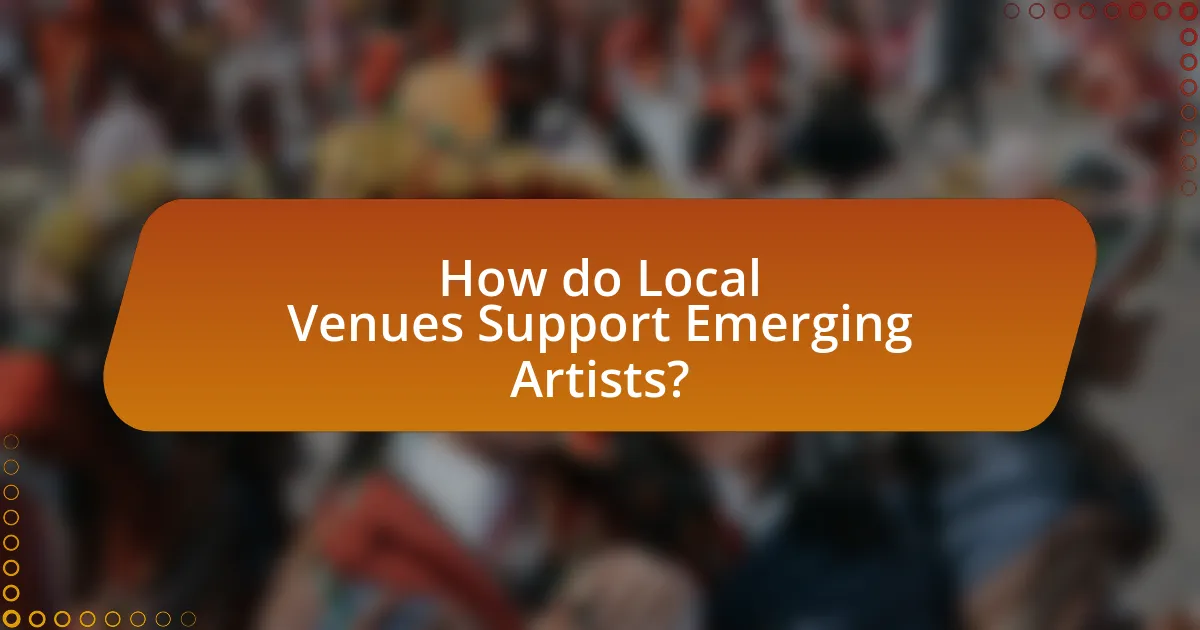
How do Local Venues Support Emerging Artists?
Local venues support emerging artists by providing them with performance opportunities, exposure, and resources essential for their growth. These venues often host open mic nights, showcases, and local music festivals, allowing new talent to perform in front of live audiences. According to a study by the National Endowment for the Arts, local venues contribute significantly to the cultural landscape by fostering community engagement and providing a platform for artists to connect with fans. Additionally, many local venues offer promotional support through social media and marketing, helping emerging artists reach wider audiences and build their brand.
What opportunities do local venues provide for new musicians?
Local venues provide essential opportunities for new musicians by offering performance spaces, exposure to local audiences, and networking possibilities. These venues often host open mic nights, showcases, and support local music events, allowing emerging artists to gain stage experience and build a following. According to a study by the National Endowment for the Arts, local music venues contribute significantly to the cultural landscape, fostering community engagement and providing a platform for new talent to connect with fans and industry professionals.
How do open mic nights and showcases benefit artists?
Open mic nights and showcases benefit artists by providing them with a platform to perform in front of an audience, which enhances their visibility and helps build a fan base. These events allow artists to gain performance experience, receive immediate feedback, and network with other musicians and industry professionals. According to a study by the National Endowment for the Arts, participation in live performances significantly increases an artist’s chances of gaining recognition and opportunities in the music industry. Additionally, local venues hosting these events contribute to the community by fostering a vibrant music scene, which can lead to increased attendance and support for artists.
What partnerships can local venues form with artists?
Local venues can form partnerships with artists through collaborative events, promotional support, and revenue-sharing agreements. Collaborative events, such as co-hosted concerts or art exhibitions, allow venues to showcase local talent while attracting audiences. Promotional support can include marketing efforts where venues promote artists through social media, newsletters, and on-site advertising, enhancing visibility for both parties. Revenue-sharing agreements enable venues to split ticket sales or merchandise profits with artists, incentivizing performances and fostering a mutually beneficial relationship. These partnerships not only support the local music scene but also create a sustainable ecosystem for artists and venues alike.
Why is it essential for artists to build relationships with local venues?
Building relationships with local venues is essential for artists because it facilitates performance opportunities and enhances community engagement. Establishing connections with these venues allows artists to secure gigs, which are crucial for income and exposure. Furthermore, local venues often have established audiences that can help artists grow their fan base. According to a study by the National Endowment for the Arts, artists who perform regularly in local venues are more likely to develop a loyal following, leading to increased ticket sales and merchandise revenue. Additionally, these relationships can lead to collaborations and networking opportunities with other local artists and industry professionals, further enriching the artist’s career.
How can networking with venue owners enhance an artist’s career?
Networking with venue owners can significantly enhance an artist’s career by providing access to performance opportunities and industry connections. When artists build relationships with venue owners, they increase their chances of securing gigs, which are essential for gaining exposure and building a fan base. For instance, artists who perform regularly at local venues often receive recommendations for larger events or festivals, as venue owners typically have industry contacts and insights into upcoming opportunities. Additionally, collaborating with venue owners can lead to promotional support, such as featuring the artist in marketing materials or social media, further amplifying their reach. This strategic networking ultimately fosters a supportive ecosystem that can propel an artist’s career forward.
What long-term benefits arise from performing at local venues?
Performing at local venues provides long-term benefits such as community engagement, audience loyalty, and enhanced networking opportunities. Community engagement fosters a strong connection between artists and local audiences, leading to increased support for future performances. Audience loyalty develops as local fans become invested in the artist’s journey, often resulting in higher attendance at future shows and merchandise sales. Enhanced networking opportunities arise from interactions with other local artists, venue owners, and industry professionals, which can lead to collaborations and career advancements. These benefits contribute to a sustainable music career and a thriving local music scene.
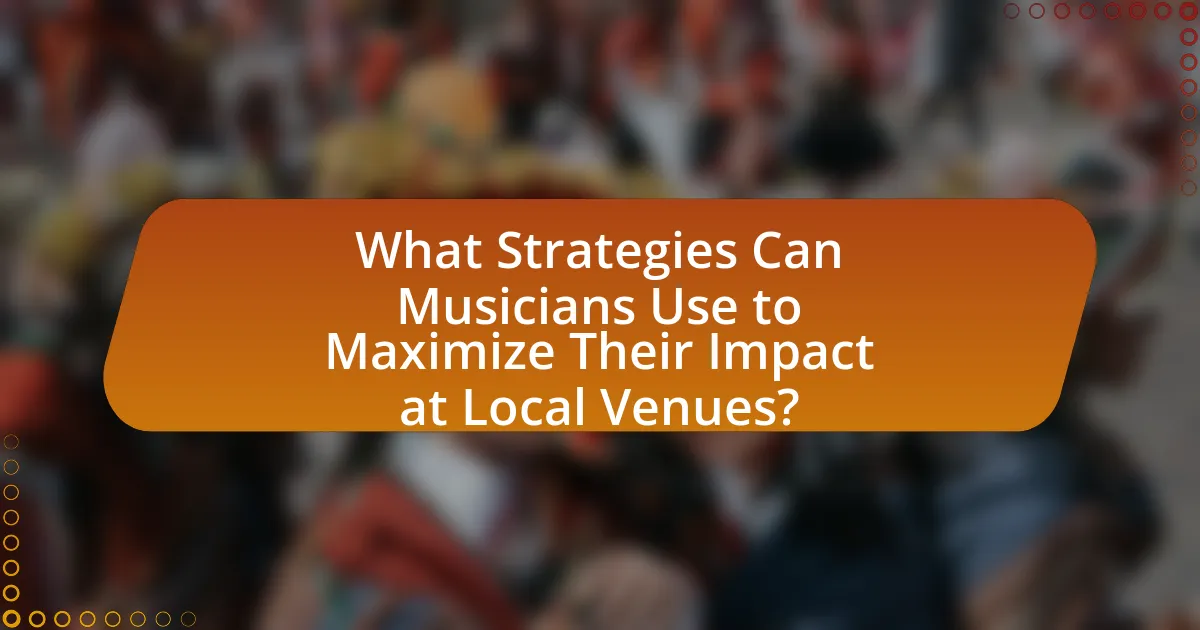
What Strategies Can Musicians Use to Maximize Their Impact at Local Venues?
Musicians can maximize their impact at local venues by engaging with the community, promoting their performances effectively, and delivering high-quality live shows. Engaging with the community involves building relationships with local fans, collaborating with other artists, and participating in local events, which fosters a loyal audience base. Effective promotion includes utilizing social media platforms, local press, and email newsletters to reach potential attendees, as studies show that targeted marketing can increase attendance by up to 30%. Delivering high-quality live performances ensures that audiences have a memorable experience, leading to positive word-of-mouth and repeat attendance, which is crucial for sustaining a local following.
How can artists effectively promote their shows at local venues?
Artists can effectively promote their shows at local venues by leveraging social media platforms, engaging with local communities, and collaborating with other artists. Utilizing social media allows artists to reach a broader audience quickly; for instance, platforms like Instagram and Facebook can be used to share event details, behind-the-scenes content, and engage with fans through interactive posts. Engaging with local communities, such as participating in local events or collaborating with local businesses, helps build relationships and increases visibility. Collaborating with other artists can also expand reach, as it allows for cross-promotion to each artist’s fan base. According to a study by the National Endowment for the Arts, artists who actively engage with their local communities see a 30% increase in attendance at their shows, demonstrating the effectiveness of these promotional strategies.
What marketing techniques work best for local performances?
Effective marketing techniques for local performances include leveraging social media platforms, engaging with local influencers, and utilizing community partnerships. Social media allows artists to reach targeted local audiences quickly; for instance, Facebook events can increase visibility and engagement. Collaborating with local influencers can amplify reach, as they often have established trust within the community. Additionally, partnerships with local businesses, such as cafes or shops, can provide cross-promotional opportunities, enhancing audience turnout. According to a study by Eventbrite, 70% of event attendees discover events through social media, underscoring its effectiveness in local marketing.
How can social media be leveraged to increase attendance?
Social media can be leveraged to increase attendance by creating targeted promotional campaigns that engage local audiences. By utilizing platforms like Facebook, Instagram, and Twitter, event organizers can share event details, behind-the-scenes content, and interactive posts that encourage sharing and participation. Research indicates that events promoted through social media can see attendance increases of up to 30%, as these platforms allow for direct interaction with potential attendees and foster a sense of community around the event. Additionally, using social media advertising can specifically target demographics based on location and interests, further enhancing the likelihood of increased attendance.
What are best practices for engaging with local audiences?
Best practices for engaging with local audiences include understanding the community’s culture, utilizing local social media platforms, and collaborating with local influencers. Engaging with the community’s culture ensures that the content resonates with local values and interests, which can increase audience connection. Utilizing local social media platforms, such as neighborhood-specific groups, allows for targeted communication and fosters a sense of belonging. Collaborating with local influencers can amplify reach and credibility, as these individuals often have established trust within their communities. Research indicates that 70% of consumers are more likely to engage with brands that reflect their local culture, highlighting the effectiveness of these strategies.
How can musicians create memorable experiences for their fans?
Musicians can create memorable experiences for their fans by engaging them through interactive performances and personalized interactions. For instance, incorporating fan participation during live shows, such as inviting audience members on stage or allowing them to choose setlists, fosters a sense of connection. Research indicates that experiences involving audience engagement lead to higher satisfaction and emotional impact, enhancing the overall concert experience. Additionally, musicians can strengthen their bond with fans by sharing personal stories or behind-the-scenes insights, making the performance feel more intimate and relatable. This approach not only enriches the live experience but also encourages fans to form lasting memories associated with the artist and their music.
What role does audience interaction play in a successful performance?
Audience interaction is crucial for a successful performance as it enhances the overall experience for both the performer and the audience. Engaging with the audience fosters a sense of connection, making the performance more memorable and impactful. Research indicates that performances with high levels of audience interaction can lead to increased emotional responses, which are essential for creating lasting impressions. For instance, a study published in the Journal of Music Psychology found that concerts where artists actively engaged with their audience resulted in higher satisfaction ratings and a greater likelihood of attendees returning for future events. This demonstrates that audience interaction not only enriches the performance but also contributes to the sustainability of local music scenes by encouraging repeat attendance.
What are the key takeaways for supporting local music scenes on tour?
Supporting local music scenes on tour involves actively engaging with the community, collaborating with local artists, and promoting local venues. Engaging with the community can include participating in local events and fostering relationships with local fans, which enhances the overall concert experience and builds a loyal audience. Collaborating with local artists not only showcases regional talent but also creates opportunities for cross-promotion, benefiting both touring acts and local musicians. Promoting local venues is crucial, as these spaces are often the backbone of the music scene; by drawing attention to them, touring artists help sustain the local economy and culture. According to a study by the National Independent Venue Association, independent venues contribute significantly to local economies, emphasizing the importance of supporting these spaces during tours.
